This second installment of Erin A. Cowling and Glenda Y. Nieto-Cuebas’ interview with playwright Octavio Solis investigates Solis’ latest Golden Age adaptation, Quixote Nuevo, and continues the conversation about representations of the borderlands between Mexico and the United States in his work.
The Making of the Shiny Knight of Chicanos, Part Two
A Conversation with Octavio Solis
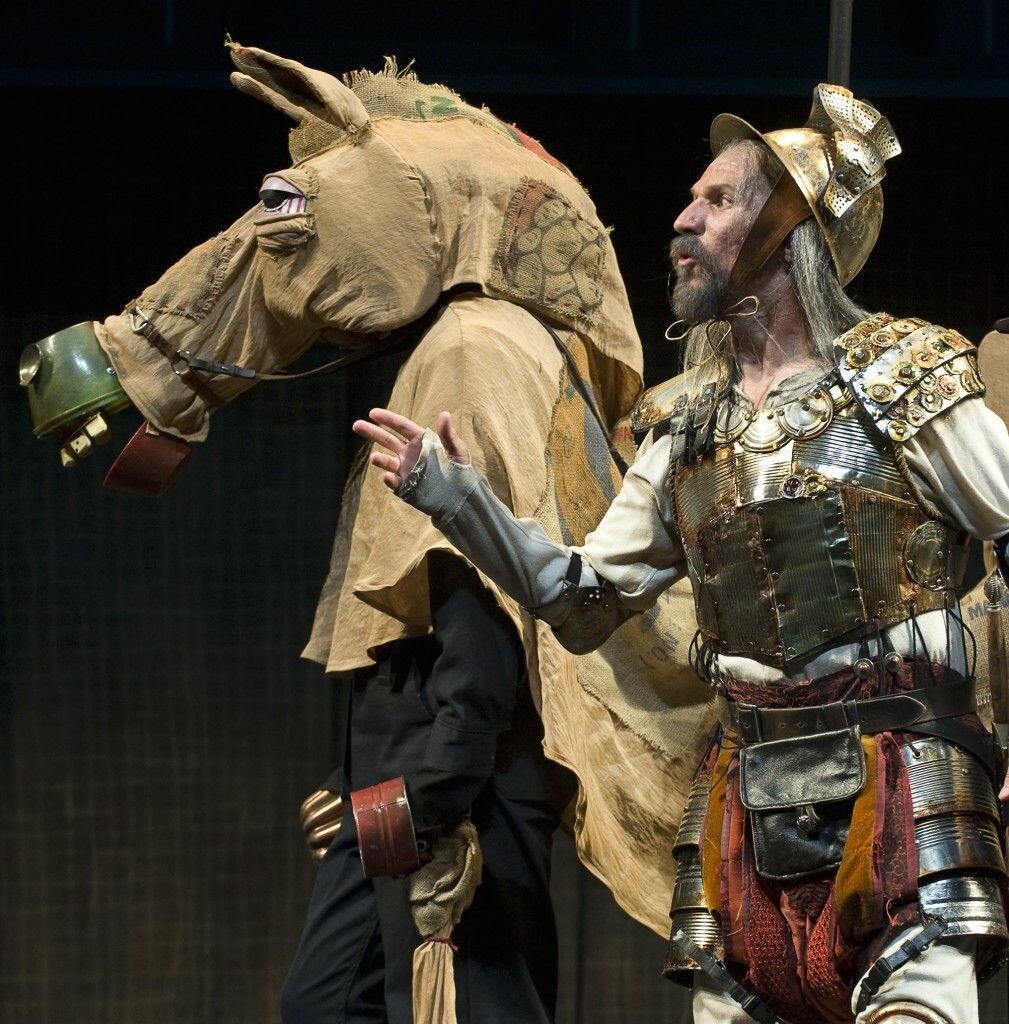
Armando Duran in Quixote by Octavio Solis at the Oregon Shakespeare Festival. Directed by Laird Williamson. Photo by David Cooper.
Glenda Y. Nieto-Cuebas: We would like to turn our attention to your work with the Quixote, which is not a play originally, but a two-volume book. I imagine that it can be quite intimidating for those who might want to adapt it to the stage. What brought you to the Quixote as a potential source?
Octavio Solis: For their 2009 season, the Oregon Shakespeare Festival (OSF) asked me to adapt a straight-up version of Don Quixote by Miguel Cervantes. So my wife and I went to Spain. We read the novel while we were out there and toured around La Mancha. We went to see those windmills and met tourists who asked if those were the windmills Don Quixote fought with because they thought he was a real person. The OSF and I worked on that commission, which was produced as Quixote. It was the theatre company that came to me and offered me the opportunity.
In my latest version, Quixote Nuevo, I tried to include some of the novellas in that early version of Don Quixote, but they felt like real subplots that demanded deeper attention.
Erin A. Cowling: You do include Cardenio.
Octavio: I did include the Cardenio story in Quixote and even included a little of the captain Viedma story. I had him appear at the end and give his account of how he was haunted by this siren song he heard every morning when he was in prison. In the end, they distracted me from the main story of Don Quixote. I was trying to be loyal and faithful to the novel in the way that Man of la Mancha was decidedly not.
I needed to find my own voice within Quixote himself.
When I read Don Quixote, I was immediately taken by its tremendous wit and humor, the bawdiness and earthiness I saw in the Spanish people. They are pranksters and raconteurs; they are highly jocular people. When you go to cafes, they don't have music playing, the lights are bright, and they are drinking beer and having a lot of fun talking. These cafes sound like hives when you walk past them in Madrid or Barcelona. Cervantes’ novel has that strong, jocular, really lovely storytelling volubility. The people are connected to their earthiness and their own bodily functions, and I wanted to honor that.
All the digressions, these little novellas, are all part of the novel. As I mentioned, these people were pranksters. They always pull pranks on Don Quixote and Sancho in the novel, particularly in Book Two. But the whole story is a prank because I feel like Cervantes was writing it to mock the people who were into swords, knighthood, sorcery, and things like that. Tales of knighthood, dragons, chivalry, and damsels needing rescuing were very popular in his time. (They still are.) He thought all that was silly, that authors should write about the real world, so he wrote this novel to make fun of that. He wanted to remind the Spanish people that they are worthy of stories as they are. At the end of Book One, Cervantes wanted to end writing Quixote’s adventures, but if the people wanted him to continue torturing Don Quixote, they could write their own stories. They took him up on it, even though I don't think he meant it. There were a series of “fake” Quixote stories, which I think really pissed him off. So, ten years later, he returned to the adventures of Don Quixote by penning Book Two, which was far more interesting than Book One.
Erin: What you just said about Cervantes telling Spaniards that they are worthy of being the protagonist is what you’ve done with taking these stories and putting them in the borderlands. You make Quixote the shining knight of the Chicanos.
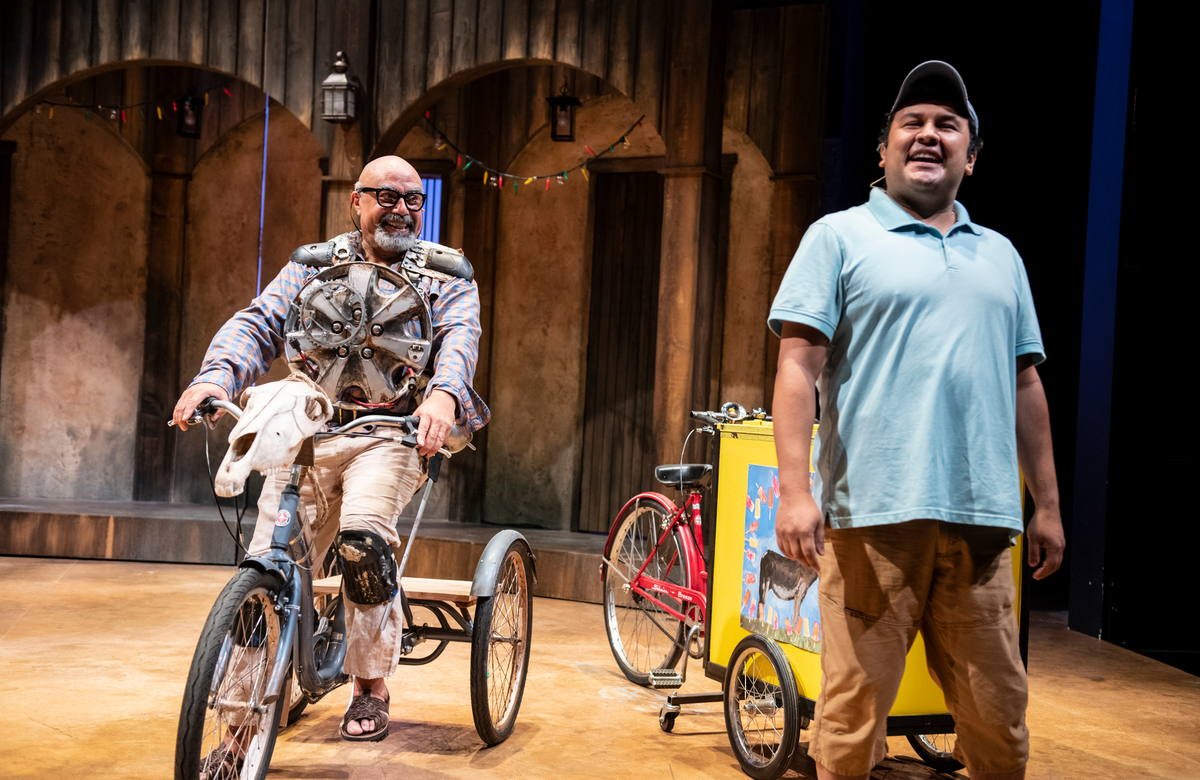
Herbert Siguenza and Ernie González, Jr. (Sancho Panza/Manny Diaz) in Quixote Nuevo by Octavio Solis at Round House Theatre. Directed by Lisa Portes. Scenic Design by Milagros Ponce de Leon. Costume and Puppet Design by: Helen Huang. Lighting Design by Alberto Segarra. Composer and Sound Design by David Molina. Photo by Margot Schulman Photography.
Octavio: I felt I had to do that because, even though I was faithful in the first adaptation, I felt like I couldn't own it. Cervantes scholars were going to see the play and recognize events from the novel so they could turn to their students and tell them that I was loyal to Cervantes, but I didn't see myself in there very much. I needed to find my own voice within Quixote himself.
Shakespeare Dallas asked me to do my adaptation of Quixote, but they wanted a more updated version set in Texas and with more Spanish to make it more Latino, more Chicano. I felt like we were closing in on the right version at last. I had a Spanish director, Gustavio Tambascio, who had worked in opera for a long time, but he didn't understand the Chicano culture. His experience was more with Italian Spaghetti Westerns, which left me unsatisfied with the work. I felt closer, though: I was at least in Texas now, but it still wasn’t quite right.
The following year, Eric Ting, the artistic director at Cal Shakes (California Shakespeare Theatre), wanted to do the version that I had just done, and he had enlisted an excellent Latina director, KJ Sanchez, for that purpose. Eric told me he wanted to do my play but didn't think I was finished. He wanted me to wrest the novel away from Cervantes and make it my own. I rose to the challenge, and KJ helped me reconceive the play: we cut out all the subplots and redesigned it for a full Latino cast to play. We centered it on an isolated border area, the Big Bend area in West Texas, in these towns that were completely isolated from the world.
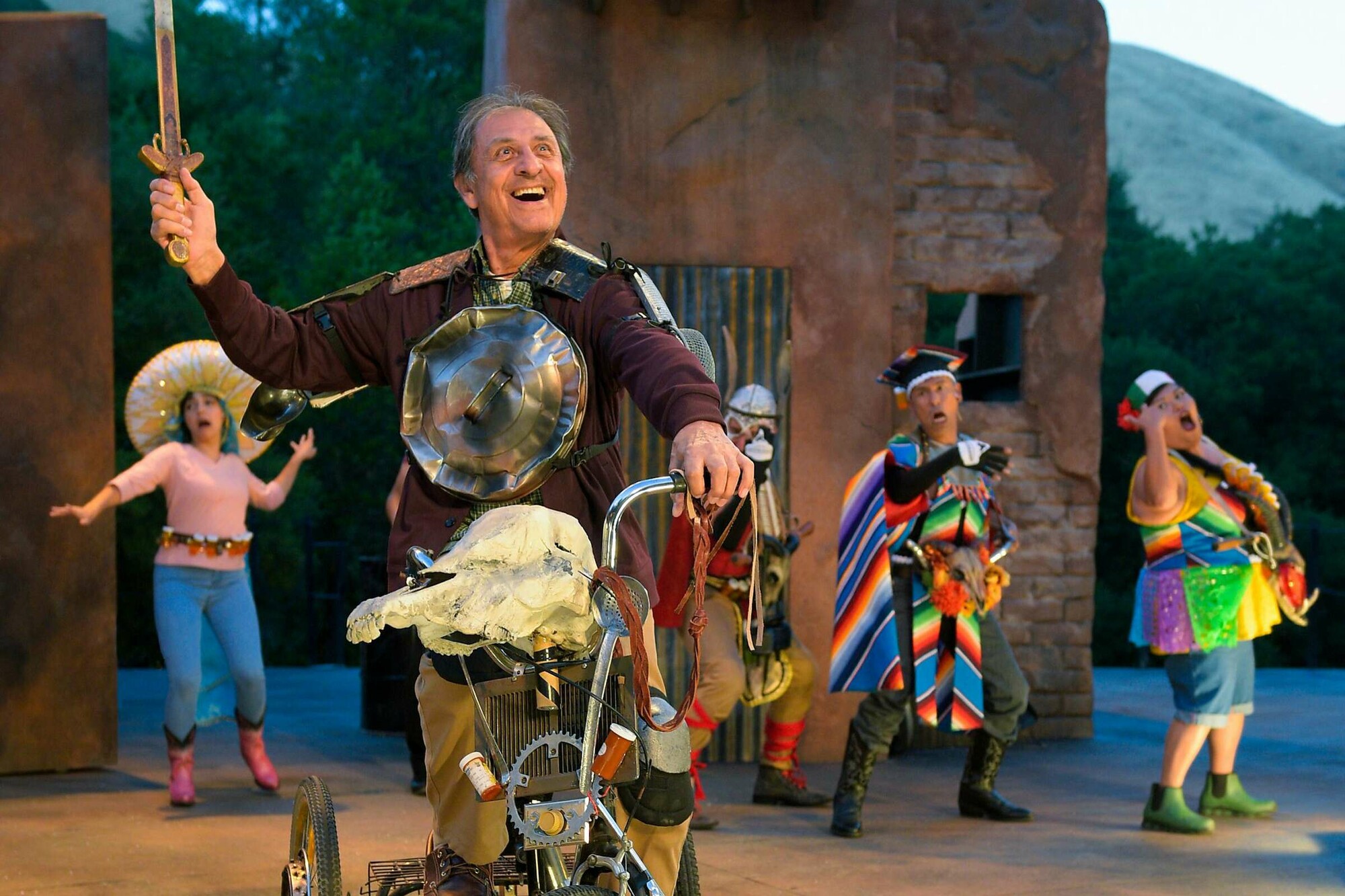
Emilio Delgado, Gianna DiGregorio Rivera, Juan Amador, Carlos Aguirre, and Amy Lizardo in Quixote Nuevo by Octavio Solis. Directed by KJ Sanchez. Music Direction by Eduardo Robledo. Scenic Design by Annie Smart. Costume Design by Ulises Alcala. Lighting Design by Wen-Ling Lao. Sound Design by David R Molina. Photo by Kevin Berne.
When I went to that part of Texas, the landscape resembled some of the rockier parts of La Mancha: there’s really severe, hard land as well as the rich greenery of the Río Grande Valley. I set my play in that environment because it felt familiar to me. It felt like home, and I started feeling myself in the story. I started writing the kind of play I had written when I first began Man of the Flesh. I incorporated calacas and the Day of the Dead into the work. Instead of the Calaca Flaca portrayed as Mother Death, the mother of Don Juan, I created Papa Muerte, a kind of father to Don Quixote. It was true and really satisfying. I felt like it was coming practically full circle to Man of the Flesh. I felt like somewhere I could thrive. This was Chicanoland. This was me; I was home. It took a while to get to this point, but it was all part of my process. I could not have arrived at Quixote Nuevo without all the previous versions and people involved in them. This latest version, directed by Lisa Portes at Round House Theatre in Washington, DC and the Denver Center for Performing Arts, is the culmination of that process.
Glenda: It is such a genius masterpiece because you make it your own, bring it to your context.
We also wanted to ask you about the language because you use a Spanish title and Spanglish dialogue to tell a story from the Spanish Golden Age period. What does it mean for you to do this?
Octavio: It means that I am acknowledging that my tongue is split into two. Part of it is very well versed in English, but it still has a part of my native español, a part that has unfortunately atrophied. I feel like I've lost my Spanish as a first-generation American. I used to dream in Spanish but no longer do. It is my task to find it again and dig up that other secret language of my childhood, since it's part of me as well. Because I'm dominant in English, my English is really how I think and speak now, but Spanish is always there. I hope to work on it more so I can pass that idiomatic legacy onto my daughter, who unfortunately speaks almost no Spanish.
All my plays have Spanish and Spanglish words that don't exist in any dictionaries in Mexico or the United States; they are an integral part of Chicano culture. I've never forgotten that hybrid dialect because it was rich in El Paso in the seventies, though lately the town has lost much of that “pachuco-speak.” Still, many people embrace that other name for El Paso: El Chuco. Using that term accesses our mother tongue among the people who know and live at the border. It's also prevalent on the other side of the Rio Grande in Juarez, Mexico, which is far more bilingual than people think.
It means that I am acknowledging that my tongue is split into two. Part of it is very well versed in English, but it still has a part of my native español, a part that has unfortunately atrophied.
Glenda: Could you explain to us your politically and socially committed vision in this Quixote Nuevo and how recent political events have affected your readaptation of the play?
Octavio: I try not to be political. I don’t want to beat people over the head with my political sensibilities, nor do I want to preach to the choir. However, whenever I tell someone that my plays are not political, they remind me that I am making a political statement by even writing the play. In reality, I just wanted to write about people in love, who are angry at each other, who have issues that they want to grapple with, issues involving betrayal, death, loss, and discovery. All these wonderful messy things that everyone else gets to explore.
In the last five or six years, though, I feel like we as artists have given up our right to take a stance, and many people—starting with our former president, from the top all the way down—have taken their strong stance on issues regarding the border. They feel they can say anything about the disenfranchised, the people in need, the undocumented. I feel that if they are proclaiming their beliefs about my people, I have to find the voice to repudiate that, or else I will regret it. We've had some avid theatergoers walk out of my shows as soon as the play needles them about immigration. I had to take a stand with my plays Quixote Nuevo and Mother Road, another play I was writing around the same time, because I felt pushed. Sometimes you take those political stances, and as time changes, your play feels dated. To me, these issues with the border will never go away, so I suspect my plays will always be relevant. As long as people see opportunity on this side of the border, they will always be coming, because they were always here. This was their land before anyone else was here.
To me, these issues with the border will never go away, so I suspect my plays will always be relevant.
Erin: I think the border is such a strong image. In Dreamlandia and Quixote Nuevo, the way people talk about it, to me, is almost like its own character or personality. The power that it has and the power that it allows some people over others—to me, it almost replaces the powers of the nobility, honor, and their system in that early modern era. Could you talk more about how you used the border as its own thing in your writing?
Octavio: In Retablos, I wrote a creative non-fiction story based on a real event. There's an incident that happened to me when we were playing hide and seek in our neighborhood when we were kids, and I hid in the cotton fields. I was maybe ten, and it was dusk. While I was hiding, I saw a girl there who was hiding because she had just come over from the river and was changing clothes to look more American. We saw each other and didn't say anything at all. I was scared since I didn't know who she was or how she was there, but she seemed so mysterious crouched between all these cotton balls. I realized she was afraid of me too, since I could just come up and say “Migra aquí!” or “mojada, una mojada aquí!” I had a power of privilege over her that I hadn't realized before. At the same time, she held power over me because she was older. Because I caught her while she was changing into dry clothes, I was struck by how beautiful she was, yet it scared me because I was young and didn't know how to react. She stayed low, and I stayed hidden. The other kids were eventually gave up looking for me and called out that they were quitting the game and going home. Eventually the Border Patrol came by, and they were looking for her, and for a moment we were suddenly equalized. I was, like her, hiding from the Border Patrol, petrified with fear of being taken in. When they left, I turned back to look at her, but she had disappeared. I held that secret close when I went back inside to prepare for dinner, but it was a pivotal moment. That’s when I realized that the river is very powerful, and the nuances of what it means to be so close to the border echoed within me.
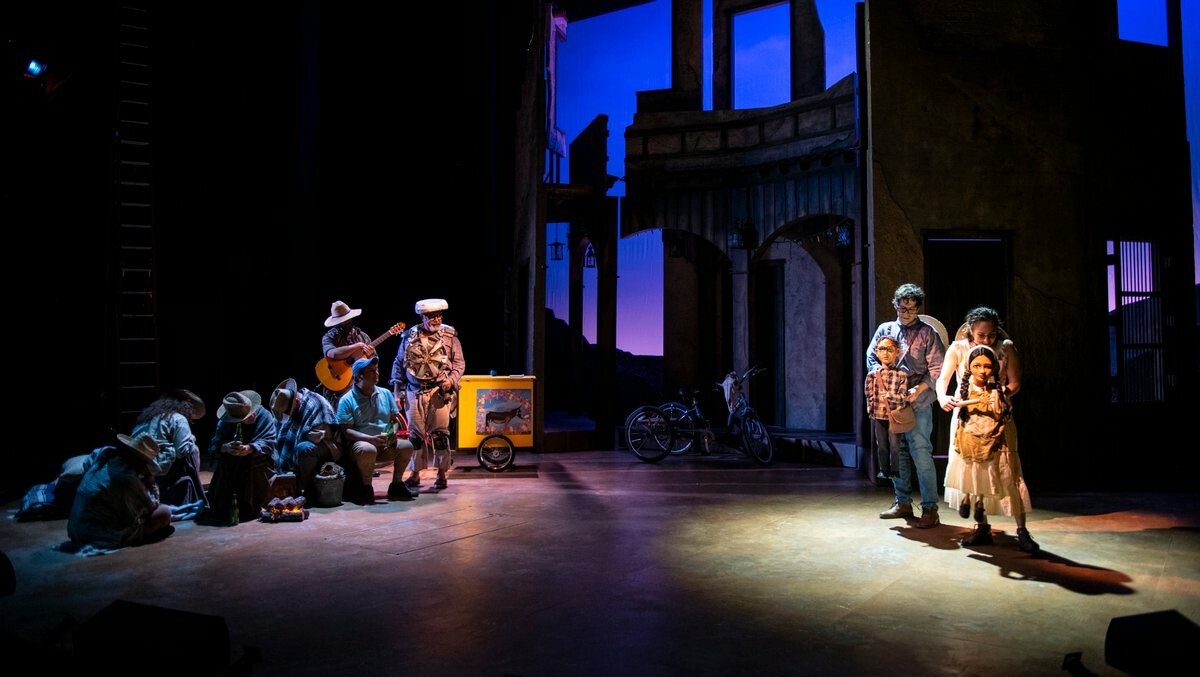
Peter Pasco, Sarita Ocón, and the cast in Quixote Nuevo by Octavio Solis at Round House Theatre. Directed by Lisa Portes. Scenic Design by Milagros Ponce de Leon. Costume and Puppet Design by: Helen Huang. Lighting Design by Alberto Segarra. Composer and Sound Design by David Molina. Photo by Margot Schulman Photography.

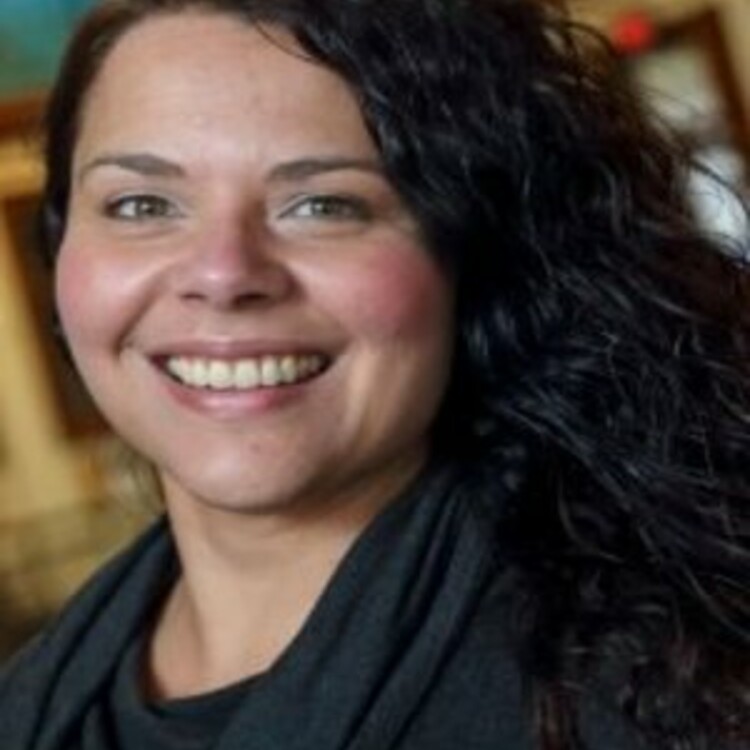


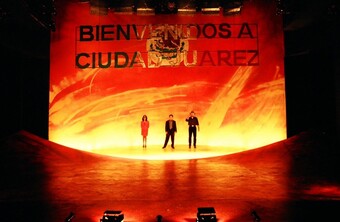



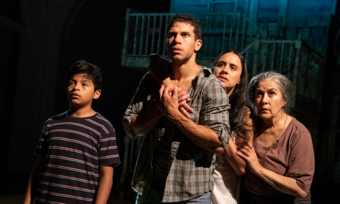


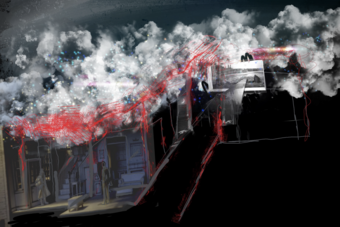


Comments
The article is just the start of the conversation—we want to know what you think about this subject, too! HowlRound is a space for knowledge-sharing, and we welcome spirited, thoughtful, and on-topic dialogue. Find our full comments policy here